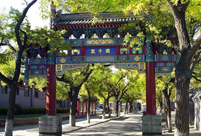 Global ambassadors of ecotourism gather in Nanjing
Global ambassadors of ecotourism gather in Nanjing
 Taiwan woman marries into Kazak family, 100 sheep plus a flat as dowry
Taiwan woman marries into Kazak family, 100 sheep plus a flat as dowry
 College girls take graduation photos under water in Chongqing
College girls take graduation photos under water in Chongqing
 Cartoon: Xi and football
Cartoon: Xi and football
 Chinese influence sweeps ROK
Chinese influence sweeps ROK
 Post-90s beauty boxer grapples four men
Post-90s beauty boxer grapples four men
 3,000-year-old tea town through lenses
3,000-year-old tea town through lenses
 22 archaeological sites along Silk Road in China
22 archaeological sites along Silk Road in China
 Football babies, Samba dancers embrace 'World Cup'
Football babies, Samba dancers embrace 'World Cup'
 Beautiful scenery along China’s Grand Canal
Beautiful scenery along China’s Grand Canal
URUMQI, July 5 -- With construction forging ahead of an expressway linking Aksu to Kashgar, Xinjiang will put another economic trunk line into use this year to boost its less developed southern area by cashing in on the country's strategy of opening to the west.
Stretching 428.5 km, the longest expressway under construction in China will facilitate economic exchanges between southern Xinjiang and the regional capital of Urumqi upon its completion, according to the project headquarters.
The road is also set to become an important corridor to Central Asia and Europe. Just as Aksu used to be a key stop along the ancient Silk Road, it will play a major part in the Silk Road Economic Belt, the modern international trade network proposed by Chinese President Xi Jinping.
Five years after rioting thugs killed nearly 200 people and injured another 1,700 in Urumqi on July 5, 2009, Xinjiang has been working to get rid of the shadow of terrorism through sound governance and the pursuit of lasting social stability and economic prosperity.
Zhang Chunxian, secretary of the Communist Party of China (CPC) Xinjiang Uygur Autonomous Regional Committee, said he foresaw Xinjiang as a "bridgehead" in China's westward opening at an international symposium held in Urumqi shortly after China, Kazakhstan and Kyrgyzstan jointly had their part of the ancient Silk Road inscribed on the UNESCO World Heritage list in late June.
With geographical advantages, Xinjiang witnessed the integration of different civilizations in history and has now come to its golden age of development, said Zhang.
To spearhead the construction of the Silk Road Economic Belt project, which could involve over 40 Asian and European countries and regions with a combined population of three billion, Xinjiang must build itself into a regional traffic hub complete with a sound transport network covering its northern, central and southern areas to connect China with Central, West and South Asia as well as Europe and Africa.
The autonomous region has also been tasked with seizing the time to build itself into a regional trade, finance and logistics center.
Zhang is meanwhile aiming to boost cultural and education cooperation with countries along the Silk Road Economic Belt to turn Xinjiang into a regional center for culture, science, technology and education.
The healthcare industry will be strengthened through medical exchanges and cooperation with surrounding countries as the regional authority hopes to boost medical tourism.
According to Zhang, Xinjiang is even striving to be China's oil and gas processing and storage center, a large domestic base for coal power and coal chemical industries and wind power generation, as well as a land thoroughfare for energy and resources.
The regional government's development plan was made public after President Xi emphasized the significance of good governance in Xinjiang at the second central work conference on Xinjiang in late May.
Xi said that a priority of good governance is to improve people's livelihood so that everyone from all ethnic groups feels taken care of, and that the government should focus on employment, education and poverty alleviation.
At a meeting of the regional CPC Committee in late June, Zhang Chunxian said that to pursue social stability and better governance under the new circumstances, Xinjiang will modernize its governance system and capability by boosting the local economy and improving the people's livelihood, safeguarding national unity and ethnic solidarity, curbing religious extremism and strengthening the rule of law.
According to the region's official news portal Tianshannet (www.ts.cn), the current goal of Xinjiang is to contain the permeation of religious extremist forces and terrorist activities, and to maintain social stability and tackle the deep-rooted problems hindering the autonomous region from achieving better governance and lasting peace.
Ma Dazheng, a researcher with the Chinese Academy of Social Sciences' Research Center for Chinese Borderland History and Geography Studies, said that the central leadership's vision on the governance of Xinjiang has become clearer with the opening of the second work conference on Xinjiang.
"A major change we have seen over the past five years is that better governance and lasting stability have become the top priority of the administrative goals while development is expanded from economic spheres to the overall development of the society," he observed.
"To improve the societal well-being of the people, ethnic and religious work is essential as half of the Xinjiang population are ethnic minorities and religious."
Pan Zhiping, professor with the Central Asia Research Institute with Xinjiang University, said that an inflection point has been reached in China's anti-terrorism and anti-extremism drive, with many more well-educated people and social leaders among ethnic minorities openly opposing religious extremists.
For instance, an open letter signed by more than 200 Uygur writers, poets and translators in Xinjiang has been widely relayed on the Internet denouncing terrorism.
In May, 11 Uygur youths from nine Chinese universities published a letter calling for fellow Uygurs to speak out on religious extremism and lend a hand to youths who may fall prey to it.
"Xinjiang has encountered reckless provocations from religious extremists due to the instability both within and without China. It's important for the administrators to have a clear and thorough understanding of the complexity of anti-terrorism situation and take a long-term perspective," said Ma Dazheng.
 Featured hutongs in Beijing
Featured hutongs in Beijing Separate college entrance exam
Separate college entrance exam Flash mob dance
Flash mob dance Picturesque scenery of Ghost City
Picturesque scenery of Ghost City Children attend First Writing Ceremony
Children attend First Writing Ceremony Female master poses for graduation photos with son
Female master poses for graduation photos with son Silk Road, China's Grand Canal listed as World Heritage Sites
Silk Road, China's Grand Canal listed as World Heritage Sites PKU students imitate famous paintings in real-person photos
PKU students imitate famous paintings in real-person photos Chinese 'Slumdog Millionaire'
Chinese 'Slumdog Millionaire' Islands in S. China Sea better shown on new vertical atlas of China
Islands in S. China Sea better shown on new vertical atlas of China Girl takes father’s portrait to travel the world
Girl takes father’s portrait to travel the world Images of Xi'an: Part one
Images of Xi'an: Part one In Pictures: Female fans of World Cup
In Pictures: Female fans of World Cup Top 20 hottest women in the world in 2014
Top 20 hottest women in the world in 2014  China's top 10 representative architectures
China's top 10 representative architecturesDay|Week|Month